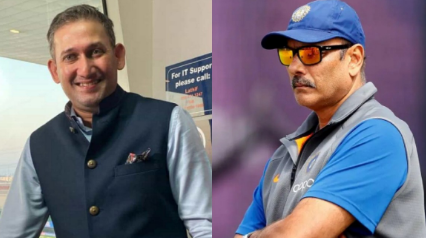
Indian cricket may soon witness a major administrative shake-up, as reports suggest that former head coach Ravi Shastri is being considered to take over as the Chairman of the BCCI Senior Men’s Selection Committee, replacing Ajit Agarkar. While no official confirmation has been made by the Board of Control for Cricket in India (BCCI), discussions within cricketing circles have intensified in recent days, pointing toward a possible shift in the selection panel’s leadership and approach.
Ajit Agarkar, who was appointed as India’s chief selector in 2023, has been at the helm during an eventful period that included several high-profile series, team transitions, and key selection calls leading up to major tournaments. Though his tenure has overseen successes, including the development of new players and balanced squad combinations, it has also faced scrutiny from fans and media alike. Debates around player workload, fitness management, and the balance between senior players and emerging talents have sparked mixed opinions about the committee’s consistency and vision.
The possibility of Ravi Shastri stepping into the role brings a completely different level of experience and personality to the selection system. Shastri, a former India all-rounder and national coach from 2017 to 2021, is known for his strong opinions, tactical sharpness, and ability to back his players decisively. Under his coaching tenure, India achieved landmark victories overseas, including Test series wins in Australia and memorable performances in England. His leadership was often described as bold, aggressive, and motivating — qualities that could reshape the direction of the selection process if he takes over.
Sources close to BCCI discussions have hinted that the board wants a stronger, more authoritative figure in the position, someone who can bring clarity to selection policies and better communication between the team management and selectors. Shastri’s stature and his close understanding of the current generation of players make him a natural fit in that regard. His ability to handle pressure, coupled with his experience working alongside top names like Virat Kohli and Rohit Sharma, could allow for a smoother transition between team demands and selection decisions.
However, there are practical considerations to address. The role of a chief selector is not the same as that of a coach. It requires administrative discipline, unbiased evaluation, and long-term planning beyond short-term performance. Shastri’s outspoken nature, while admired by many, could also challenge the traditional structure of the selection panel, which functions through consensus and collective decision-making. Nevertheless, BCCI insiders reportedly believe his leadership and cricketing acumen could add depth and direction to the selection process, especially ahead of a new cycle of international tournaments.
Agarkar’s time as chief selector has been marked by a mix of progress and pressure. He helped oversee the emergence of new talents such as Rinku Singh and Yashasvi Jaiswal and maintained faith in India’s senior players during crucial series. Yet, questions about rotation policy, player rest management, and squad experimentation have led some within the BCCI to call for a “fresh perspective.”
If Ravi Shastri is indeed appointed, his arrival would signal a bold new era for Indian cricket selection. His deep understanding of the game’s modern demands and the confidence he commands among players could bring stability and purpose. Shastri is known for his emphasis on self-belief and team culture, qualities that may influence how selections are made — focusing on character and mindset as much as skill.
The final decision is expected to be taken after internal consultations within the BCCI’s apex council. Whether or not Shastri replaces Agarkar, the discussions themselves underline the board’s intent to maintain India’s dominance by ensuring the right leadership at every level. For now, Indian cricket waits with keen interest to see if one of its most outspoken and respected voices will soon be shaping the country’s future squads from the selection table rather than the commentary box.

